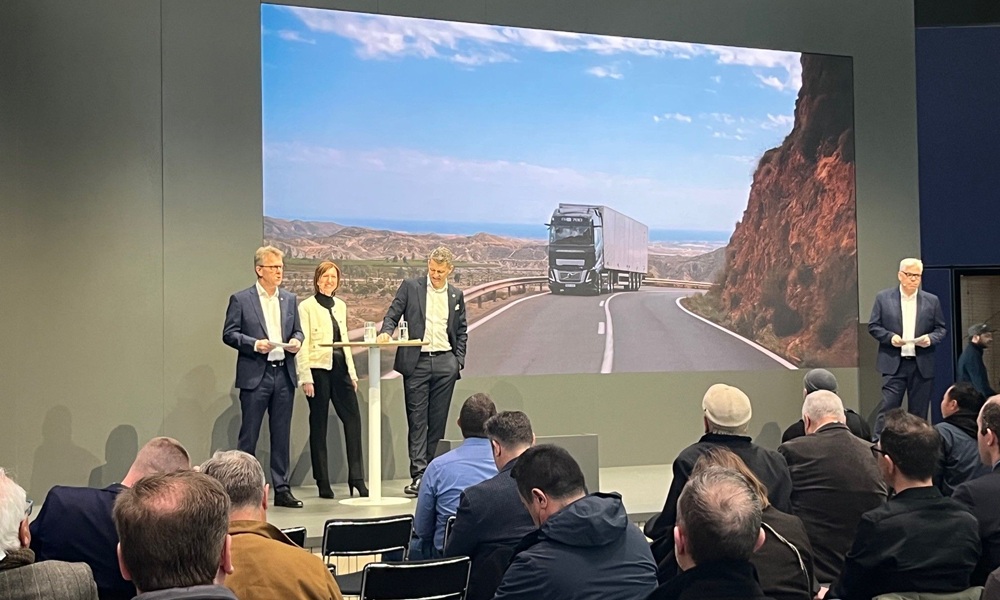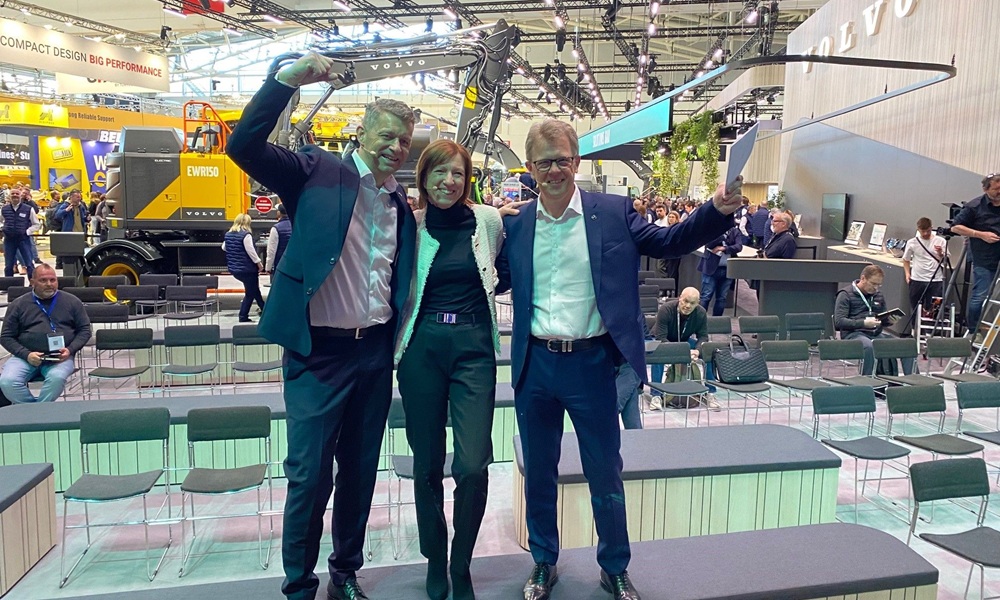The unveiling of the first-ever battery-electric articulated hauler in its size class — the Volvo A30 Electric — was the highlight of Volvo’s electrifying press conference at bauma 2025. Volvo Construction Equipment (CE) President Melker Jernberg, alongside Roger Alm, President of Volvo Trucks, and Anna Müller, President of Volvo Penta, presented the company’s most ambitious step yet in sustainable equipment innovation.
“We will soon see something. Let’s see how many of you could guess what it is,” Jernberg teased just moments before unveiling the hauler. “It’s a world first. It’s something that not even we thought we were able to do just a couple of years back.” With the A30 Electric, soon to be joined by a 40-tonne variant, Volvo now boasts a fully electric lineup, with conventional combustion engine versions available for all models — “so you can choose,” as Jernberg put it.
A Multi-Path Approach to Sustainability
While battery-electric technology stood centre stage, the message from the Volvo Group was clear: there is no single solution for decarbonising construction and transport. Instead, the company is advancing a broad portfolio that includes hybrid powertrains, biodiesel compatibility, hydrogen internal combustion engines, and even fuel cell electric vehicles.
The message from the Volvo Group’s executives on stage was unified: there is no silver bullet. “We don’t believe in one only solution. It will be a range of different solutions,” said Jernberg. These include battery electric, hybrid, internal combustion engines running on biodiesel and HVO, and future fuel cell electric options.
“We’re quite sure also that the internal combustion engine will continue to play an extremely big role in our industry,” Jernberg noted. “And that’s the reason why we continue to invest heavily in that technology.”
Anna Müller added: “We are now investing substantially in different technologies, but we also see that it’s more important than ever to work very close to our customers… to secure that we can provide the right solutions and the right technology for their needs.”
Electrification Across the Volvo Group
Roger Alm emphasised how Volvo Trucks is leading with a wide electric offering: “Battery electric will be the main path for Volvo Trucks to reach net zero. Today, Volvo is market leader in Europe with 50% [market share].” He added that electrical Volvo trucks have already accumulated mileage equivalent to “4,000 laps around the world.”
Meanwhile, Volvo Penta’s modular battery energy storage systems are addressing the rising demand for reliable charging infrastructure. “Battery energy storage is becoming a vital part of the construction ecosystem,” said Müller, highlighting a new rental-based model developed in partnership with Bowles and ePower.
Volvo’s commitment to sustainability goes beyond emissions. From the design phase to end-of-life recycling, every product is developed with environmental responsibility in mind. Materials are sourced more sustainably, circular economy principles are being implemented across operations, and the company continues to explore how digital tools can further minimise waste and inefficiency.
From Volvo Penta’s scalable battery energy storage systems to Volvo Trucks’ market-leading fleet of electric trucks — already clocking the equivalent of 4,000 laps around the world — the company demonstrated how its electrification strategy extends across every segment.
“With eight electric truck models in production, we have solutions for every customer need, every market, and every application,” said Alm. “And thanks to our modular approach, our products — electric or diesel — offer the same outstanding safety, comfort, and fuel efficiency.”
Müller added that Penta’s new modular battery systems are already being deployed via a rental-based model, enhancing grid resilience on construction sites.

Digital Tools Drive Productivity
At the event, Volvo also showcased the latest in site-wide optimisation solutions, including its digital Site Operation platform and on-site consultancy service, Site Optimization. These services are designed to reduce operating costs by up to 30%, increase fuel efficiency by 15%, and improve safety and uptime.
Volvo’s vision of the future construction site is one that is smarter, cleaner, and fully connected. Digital twin technology, proactive machine monitoring, and predictive maintenance powered by AI are already helping customers reduce downtime and maximise productivity.
“A machine or a truck in itself is good, but it’s not enough,” said Jernberg. Among the highlighted tools was Volvo Site Operation — a digital twin platform that allows full visibility across machines, trucks, and site assets. According to Jernberg, this solution alone can deliver “up to 15%” improvements in productivity and fuel efficiency.
The second tool, Site Optimization, is an on-site consultancy service, explained Jernberg. “It just shows that when you have a site in the old way, without planning, you’re working hard. But if you plan and really dig into it… you get a cost reduction per tonne up to 30%.”
Volvo also emphasised that innovation is not just about emissions or data — it’s about people. The A30 Electric and other next-gen machines come equipped with improved cabins designed for better visibility, lower noise, and reduced vibration, creating a safer and more comfortable environment for operators.
De-Risking Innovation for Customers
Volvo also acknowledged the uncertainties customers face when investing in new technologies. Jernberg highlighted Volvo Financial Services and Equipment-as-a-Service models that help reduce up-front risk.
“There’s a lot of different setups, but we’re also now globally approaching and learning quite successful with many customers, what we call equipment as a service, which is then, you know, pay per use, pay per use model. Not perfect for everyone, but for very many,” added Jernberg “And it’s a really win, win, win situation because it’s a guaranteed, guaranteed uptime with lower risk, but with a good product.”
Acknowledging the challenges customers face in adopting new technologies, Volvo is expanding financial services, short- and long-term rental options, and pay-per-use models under its Equipment as a Service offering. These measures aim to reduce risk and make it easier for customers to transition at their own pace.
Volvo Financial Services is playing a key role in this journey, providing the support customers need to make bold but necessary investments. As sustainability becomes a competitive advantage, Volvo is helping its partners future-proof their operations.
Alm added: “It is about the total offer — the product, the services, and financing… this package will give our customers peace of mind.”
A Unified Vision for Sustainable Construction
As the press conference concluded, each of the leaders reflected on Volvo’s direction. “Hopefully you see that we are not only talking — we are walking also,” said Jernberg.
“We will continue to invest,” added Müller, “with the vision to make our offer in the market 100% safe, 100% sustainable, and 100% more productive.”
“This is the power of the Volvo Group,” concluded Alm. “We have the solutions, we have the offerings, we have the construction machines, we have the trucks… and we will continue to invest to build a sustainable future.”
